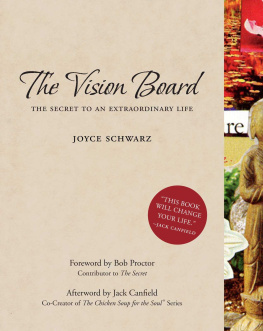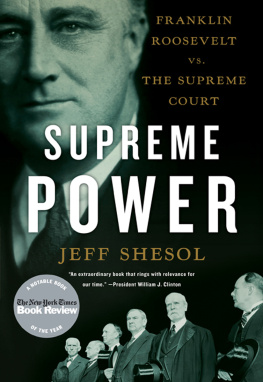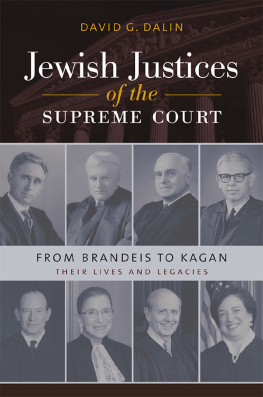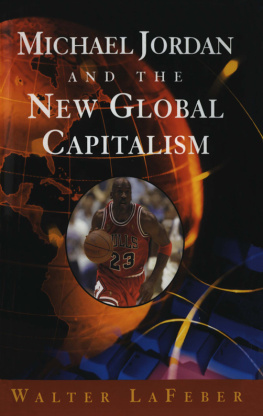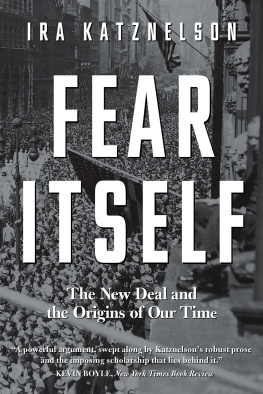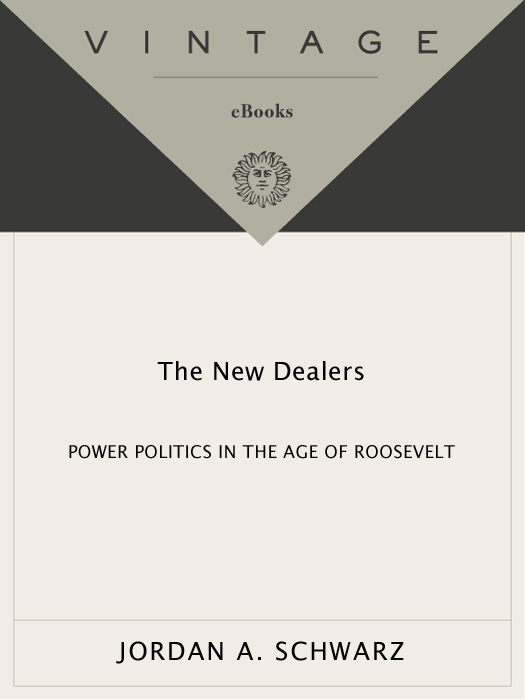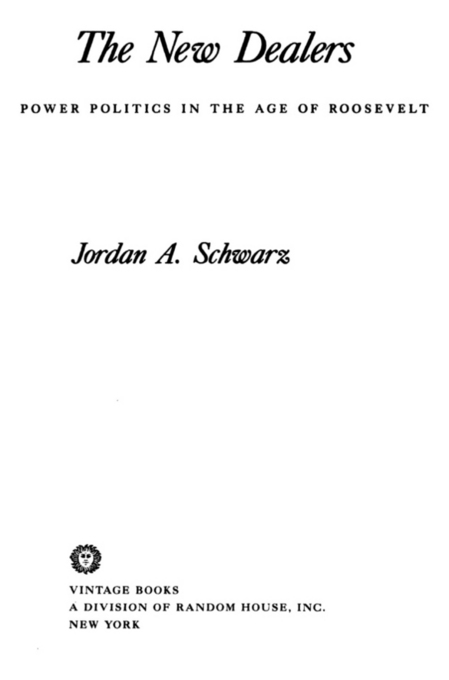JORDAN A. SCHWARZ
The New Dealers
Chicago-born at the onset of the Roosevelt depression, Jordan Abraham Schwarz is Distinguished Research Professor at Northern Illinois University and a Guggenheim Fellow. He has degrees from the City College of New York and Columbia University. His previous books include Liberal: Adolf A. Berle and the Vision of an American Era and The Speculator: Bernard M. Baruch in Washington, 19171965. He lives both in DeKalb, Illinois, and two miles south of Wrigley Field and a few blocks north of the Chicago Historical Society.
ALSO BY JORDAN A. SCHWARZ
The Speculator:
Bernard M. Baruch in Washington,
19171965
Liberal:
Adolf A. Berle and
the Vision of an American Era
The Interregnum of Despair:
Hoover, Congress and the Depression
Copyright 1993 by Jordan A. Schwarz
All rights reserved under International and Pan-American Copyright Conventions. Published in the United States by Vintage Books, a division of Random House, Inc., New York, and simultaneously in Canada by Random House of Canada Limited, Toronto. Originally published in hardcover by Alfred A. Knopf, Inc., New York, in 1993.
Grateful acknowledgment is made to TROThe Richmond Organization for permission to reprint from Roll On, Columbia, words by Woody Guthrie, music based on Goodnight Irene by Huddie Ledbetter and John A. Lomax; TROcopyright 1936 (renewed), 1957 (renewed) and 1963 (renewed) Ludlow Music, Inc., New York, NY. Used by permission.
Library of Congress Cataloging-in-Publication Data
Schwarz, Jordan A., 1937
The new dealers: power politics in the age of Roosevelt / Jordan A. Schwarz.
p. cm.
Originally published: New York: A.A. Knopf, 1993.
eISBN: 978-0-307-80069-5
1. United StatesPolitics and government1933-1945. 2. United States
Economic policy19331945. 3. New Deal, 19331939.
I. Title.
[E806.S358 1994]
338.973009043-dc20 9342221
v3.1
For Linda,
Gene and Fran
The New Dealers were men and women who deeply believed that democratic government could be used for great purposes.
ARTHUR SCHLESINGER, JR. ,
Aggressive Progressive,
New York Review of Books,
April 25, 1991
Thank you for letting me see the article for Common Sense.
I, too, am a philosopher and try to think in terms of a century, as well as in terms of this week and next.
I go further than you do, for I question whether the dark ages in Western Europe from the fifth to thirteenth centuries were really as dark as the usual historian paints them. It might be worthwhile to compare not painting or architecture or literature of the Europe of the sixth century with the Europe of the eleventh century but to compare rather the state of civilization of the mass of the inhabitants of these far separated ages. In the earlier one the mass of the inhabitants were extremely primitive tribesmensome fixed, some nomadic, organized into small wholly independent units and with little in their heads other than where to get the next meal and how to fight off the neighboring tribe. Their descendants, five hundred years later, had progressed amazingly in brain power, in wider contacts and in most of the beginnings of our modern organized society.
Another thought for youthe only civilizations which have really ended have been isolated islands like Yucatan and the Incas. They, I fear, perished without transmitting much of their gain to any other part of the world.
FRANKLIN D. ROOSEVELT
to Theodore Dreiser,
October 5, 1939
Capitalism is that subspecies of all the systems characterized by private property, which carries out new combinations of factors of production and involv[es] the creation of credit. Capitalism is as old as the phenomenon of credit creation.
fiscal demands are the first sign of life of the modern state. This is why tax has so much to do with state that the expression tax state might almost be considered a pleonasm. If the finances have created and partly formed the modern state, so now the state on its part forms them and enlarges themdeep into the flesh of the private economy. The bourgeois tax state of the present time does not exist anywhere as a pure type. Everywhere it is shot through with the elements of the past, everywhere the shadows of future developments can more or less clearly be seen to fall upon it. Yet everywhere this tax state is today the expression of the most creative forces. The tax state is not altogether limited to derived revenues. It has not only the mostly small inheritance of its predecessor, but it can also create its own economic sphere within the world of capitalism and can become an entrepreneur itself. In so doing it does, indeed, transgress its own limits. However, as long as the state has not swallowed all or most of the economy it remains essentially what it was. The decisive criterion is whether, apart from any monopoly position which it might secure for itself, the state does or does not continue to work within the framework of a free economy whose data and methods it has to accept in its own enterprises.
JOSEPH A. SCHUMPETER , excerpts from
Joseph A. Schumpeter:
The Economics and Sociology of Capitalism,
Richard Swedberg, ed.
Contents
Introduction
AS THIS IS WRITTEN it is nearly three score years ago that some intrepid Americans expanded state capitalism during the New Deal. State capitalism is an old term sometimes used pejoratively by Marxists to denigrate liberalism, but for my purposes it is usefulalthough I alternate it with the term public investment. Whichever, it describes a massive governmental recapitalization for purposes of economic development, especially in the American South and West during the 1930s. To a lesser extent this book is also about state cartelism, government organizations of industries in order to build a threshold under prices. State cartelism is not as significant as state capitalism because it is not growth oriented, tending to stabilize defensively along static lines that defeat price competitionwhich may be why cartels fail or at least fall short of goals, and why the early New Deal failed to raise and hold incomes at sustainable levels.
The New Dealers,for consumers. However, for much of 19451990, Washington disguised public investment under the category of defense. For that matter, convinced that they had fashioned models of economic development in the South and the West, the New Dealers exported their concepts of the Tennessee Valley Authority, the Lower Colorado River Authority and the Bonneville Power Authority to an undeveloped world hungry for a taste of the American standard of living. The New Deal contribution to the American century was a public credit that augmented private investment on a global scale.
This is not a book about the introduction of the welfare state. The story of the expansion of the New Deal security state is worth a book by itself, but the focus here is upon the timely opportunism of certain New Dealers who were not interested in recovery or relief, but in permanent improvements of Americas capital structure and its standard of living. The Austrian economist Joseph Schumpeter correctly described capitalism as creative destruction; the New Dealers sought to make Americans and capitalists everywhere more creative by using public capital to capture and tame the power of rivers and thereby create a demand for refrigerators, milking machines, aluminum, aircraft and atomic energy for even more power and more growth.



